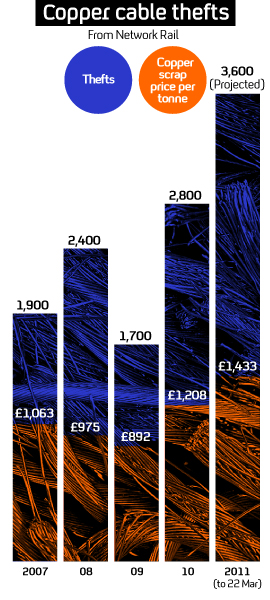Metal theft crackdown launched
Police hope a trial scheme, dubbed Operation Tornado, will stop the easy movement of stolen scrap metal, as soaring metal prices drive illicit trade. Alex Thomson reports from a Kent scrapyard.
A new scheme to tackle the problem of metal theft has launched, making it easier to trace sellers of scrap metal and harder to pass on illegitimately obtained copper and other metals.
Operation Tornado is starting as a trial project in the north east of England, and will require people who are selling scrap metal to provide proof of their identity and address.
It is part of a wider attempt by the British Transport Police and the government, in partnership with the British Metals Recycling Association, to increase controls on the sales of stolen metal.
Lord Henley, the Home Office minister for crime prevention and anti-social behaviour reduction, said: “Metal theft is a serious and growing national and international problem. It’s clear that legislation dating back to the 1960s is not sufficient to deal with an increasingly organised crime, and we are examining what changes to the Scrap Metal Dealers Act 1964 are needed.”
It’s clear that legislation dating back to the 1960s is not sufficient to deal with an increasingly organised crime. Lord Henley
Soaring copper prices spark thefts
Metal thefts are now a major problem for the rail, water and electricity networks, as well as for local authorities. Soaring prices on the global metal markets have led to a huge rise in thefts, both big and small.
A tonne of copper now costs more than £6,000 in the UK, making the theft of easily available metals a lucrative trade. Thefts over the past year range from war memorial plaques, to bandstand roofs, to cable – which stops trains from running.
Metal to cash
Chief Correspondent Alex Thomson reports from a scrapyard in Kent which is on its guard against metal theft. Ricky Hunn, who runs the yard, says: “It’s organised crime, nothing less than that.”
Read more in Alex Thomson’s blog: Hot metal – when scrap becomes cash

CI Robin Edwards said: “There is a clear correlation between the price of copper on commodity markets and rates of crime. The legislation for dealing with the crime, dating back to 1964, is outdated and needs redrafting.”
According to British Transport Police, more than £13m worth of metal has been stolen from the railways. The force says that the thefts are one of their biggest challenges after terrorism.
‘A human as well as an economic impact’
In a statement, the police said: “There is a human as well as an economic impact. While communities have lost power or communications, people miss appointments, interviews, flights. Churches and householders have had to replace roofs, councils replace manhole covers, and even plaques have been taken from a cemetery.”
Network Rail has lost around £43m over the three years up to mid-2011. Millions of passengers have been affected and delays totalling more than 16,000 hours have been recorded. Ten people have been killed in metal theft incidents in the past year.
Among successful prosecutions for theft, last year saw a man from Doncaster sentenced to 12 weeks in prison for stealing 1740kg of rail from a lineside location near Northallerton station, while two men who stole 25 metres of railway cable in Newark got a total of six years.
The ringleader of a Derbyshire cable theft gang was jailed for four and a half years. Lee Bamford, 34, pleaded guilty to conspiracy to steal cable from the railway and conspiracy to convert criminal property covering 67 individual offences. The court heard that Bamford, of Heanor, was the ringleader of a gang which targeted the railway during an 18-month campaign that saw the theft of more than 32 tonnes of cable.
At Thames Water the company says metal thefts have cost the company £1.2m a year. Earthing cables and lead roofs have been ripped from their water and sewage works, including at Aylesbury, Marlow, East Hyde and Bishop’s Stortford.
Worst hit
In London, Bexley is one of the worst hit local authorities. Thieves have targeted the ruins of a local 12th century abbey, created delays on roads by stealing manhole and gulley covers, taken plaques from war memorials, and caused a housing estate to be evacuated when thieves attacked copper piping attached to water tanks on top of tower blocks, causing severe flooding and power cuts.
Bob Collington, Thames Water’s director of asset management, said: “Metal theft at our sites costs our customers millions of pounds to put right. We are dealing with this by applying a forensic signature to all our equipment.”
Last year saw the most claims ever made by churches for metal theft. More than 2,500 claims were made to the main Church of England insurer.
In Chelmsford alone there were 90 claims for metal theft, with Lincoln and Lichfield coming in next as the worst hit areas.
John Coates, Ecclesiastical’s direct insurance services director, said: “2011 has been a very tough year, with incidents of metal theft from churches becoming virtually endemic.
“If there is any light at the end of the tunnel, it’s the groundswell of public awareness of the problem this year and the growing sense of outrage.”